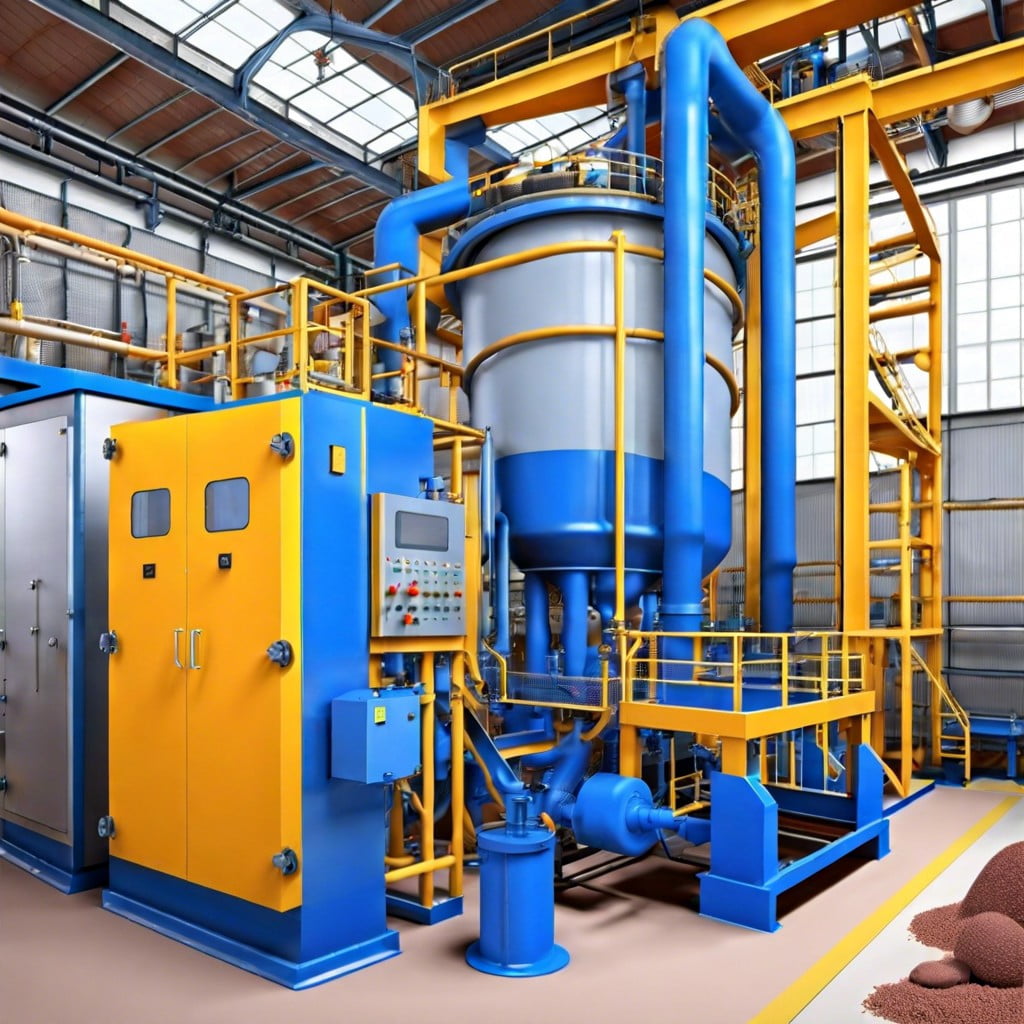Delve into the fascinating world of polymer industries because their innovative materials and their vast applications play a pivotal role in revolutionizing the construction sector.
Key takeaways:
- Polymer industries are one of the largest global manufacturing sectors.
- Polymer production involves continuous research and development for innovation.
- Polymer industries have complex supply chains and collaborate with multiple industries.
- There are different types of polymers used in various applications.
- Polymers have diverse applications in construction, automotive, packaging, medical, and aerospace industries.
Overview of Polymer Industries

The polymer industry encapsulates a vast network of companies that specialize in the production and distribution of polymers, which are long-chain molecules essential to a myriad of products. This vibrant sector combines chemistry, materials science, and engineering to transform raw materials, such as petroleum and natural gas, into versatile polymers like plastics, rubbers, and synthetic fibers.
Key points in understanding the scope of this industry include:
- Production Scale: It stands as one of the largest global manufacturing sectors, creating materials that form the backbone of modern consumerism and industrial processes.
- Research and Development: Continuous innovation is a hallmark, with polymer producers investing heavily in developing new materials and enhancing the properties of existing ones.
- Supply Chain and Logistics: The industry manages an intricate supply chain, maintaining the flow of raw materials to production facilities and then distributing polymers to various manufacturing sectors.
- Cross-industry Collaboration: It collaborates closely with multiple industries to tailor polymers to specific applications, ensuring materials meet exact performance and safety standards.
Through this lens, the polymer industry is more than just plastic production; it is a cornerstone of modern manufacturing and technology.
Types of Polymers Used in Industry

Polymers are categorized mainly into thermoplastics, thermosetting plastics, and elastomers.
Thermoplastics are moldable upon heating and can be reshaped. Examples include polyethylene (PE), used in packaging, and polycarbonate (PC), used for bulletproof glass.
Thermosetting plastics, once set into a shape by heat, cannot be remelted. Epoxy resins, used in adhesives and coatings, are common thermosets.
Elastomers are rubber-like materials that return to their original shape after stretching. Silicone rubber, for instance, seals windows and dampens vibrations.
Each type serves distinct functions across industries, chosen for their physical properties and durability to match the application’s demands.
Applications of Polymers in Construction, Automotive Manufacturing, and Packaging
Polymers have revolutionized the construction industry by introducing materials that are lightweight, durable, and resistant to corrosion. They can be easily molded into various shapes, making them ideal for components such as insulation, piping, and flooring.
In automotive manufacturing, polymers contribute to fuel efficiency through the production of lighter parts. They are integral in crafting components ranging from tires, which rely on synthetic rubber, to interior features like dashboards and seat belts, all benefiting from the versatility and strength of plastic materials.
Packaging is perhaps the most visible realm of polymer application. The use of plastics has enabled the development of a wide range of packaging designs, which ensure product safety while minimizing weight and cost. Polymers enable the creation of flexible films, rigid containers, and foam cushioning, playing a critical role in maintaining the integrity and quality of products from food to electronics throughout their lifecycle.
Medical and Aerospace Applications of Polymers
Polymers play a fundamental role in the medical field, offering unique properties that make them ideal for a range of applications. They are used to create biocompatible materials for prosthetics and implants, thanks to their versatility and the ability to mimic the mechanical properties of natural tissue. Polymers such as silicone are often used in implants due to their stability and resistance to body fluids.
In drug delivery systems, polymers enable controlled release of medications, improving patient outcomes. The development of polymer-based hydrogels, nanoparticles, and micelles has revolutionized targeted therapies, ensuring that therapeutic compounds reach specific tissues or organs with precision.
Additionally, polymers’ lightweight and high strength-to-weight ratio are invaluable in the aerospace industry. They contribute to fuel efficiency and overall performance improvements. Advanced composites, made from polymers reinforced with carbon or glass fibers, form critical components of aircraft and spacecraft, offering resistance to extreme temperatures and reducing the vehicle’s weight.
In both fields, ongoing research focuses on developing new polymer blends with enhanced biocompatibility, recyclability, and functionality suited for the extreme environments encountered in space exploration.
Environmental Impact and Sustainability in Polymer Manufacturing
Polymer production and disposal pose significant environmental challenges. Traditional polymers, often derived from petroleum, contribute to carbon emissions and waste problems. Sustainable practices in polymer manufacturing focus on minimizing these issues through various strategies:
1. Biopolymers: The development of biopolymers, which are made from renewable resources like corn starch and cellulose, reduces dependency on fossil fuels.
2. Recycling: Enhanced recycling techniques allow more plastics to be reused, reducing the volume of new polymer production and conserving resources.
3. Biodegradable Polymers: These polymers are designed to decompose more quickly, mitigating the long-term impact on landfill sites.
4. Energy Efficiency: Implementing energy-efficient processes in manufacturing reduces greenhouse gas emissions.
5. Water Reduction: Advances in technology aim to minimize water usage, helping conserve this valuable resource.
6. Life Cycle Assessment (LCA): Companies are increasingly using LCA to evaluate the environmental impact of polymers over their entire life span, leading to better practices and products.
Response to these environmental concerns is leading to a growth in green chemistry and sustainable materials development, aligning with global efforts to safeguard the planet for future generations.
Future Trends and Challenges in Polymer Industries
As we gaze into the horizon of the polymer industry, several exciting trends emerge. Biopolymers are gaining momentum, driven by the quest for sustainable materials. These are derived from biological sources and present a reduced environmental footprint. Alongside, advancements in polymer recycling technology are helping to extend the lifecycle of materials.
The integration of nanotechnology is propelling polymers into new realms of performance. Nanocomposites, or polymers with embedded nanoparticles, showcase enhanced properties such as greater strength and improved thermal stability. These materials promise to open up applications previously unattainable with traditional polymers.
3D printing technology, or additive manufacturing, is revolutionizing how polymers are used, allowing for the creation of complex and customized products at a fraction of the time and cost.
However, alongside these innovations come challenges. The management of plastic waste remains a pressing issue. As production volumes continue to grow, developing effective recycling and biodegradation strategies becomes imperative.
Regulatory pressures are also increasing, with governments worldwide enacting stricter controls on polymer production and usage. This necessitates industry players to adjust and innovate to meet these evolving standards.
Furthermore, the global market dynamics and competition require continuous research and development efforts to keep pace with consumer demands and technological advancements.
Profiles of Key Companies in the Polymer Industry
Several innovators have shaped the polymer industry, each boasting unique contributions and specialties:
- BASF SE: This German chemical giant is renowned for developing advanced materials, including eco-friendly polymers and innovations in polyurethanes and superabsorbents.
- Dow Chemical Company: As a leading player, Dow offers a diverse array of products, such as styrene-butadiene latex for paper coatings and acrylic solutions for adhesives and sealants.
- DuPont: With a focus on science and innovation, DuPont creates performance polymers that are essential in aerospace, automotive, and consumer products.
- SABIC: Saudi Basic Industries Corporation has made significant advances with their engineering thermoplastics and polyethylene and polypropylene materials.
- Evonik Industries: Noted for specialty chemicals, Evonik supplies markets with unique polymer designs for high-performance plastics used in 3D printing and automotive applications.
These companies not only lead in revenue but also pioneer new polymer solutions that continue to transform technology and improve our everyday lives.
Careers in the Polymer Industry
With a robust foundation in materials science, careers in the polymer industry offer diverse paths for professionals. Scientists and engineers spearhead research, developing new materials with enhanced properties.
Production managers and process engineers oversee the manufacturing, ensuring quality and efficiency. Sales and marketing specialists connect innovations with market needs, while environmental officers focus on sustainable practices.
Further, technical support roles assist in troubleshooting applications in industries like construction where material performance is critical.
Continuous learning and inter-departmental collaboration are pivotal in this dynamic field as team members innovate and adapt to the evolving market demands.
Industries That Rely Heavily On Polymers
Polymers play a pivotal role in a range of industries, each with its unique demands and applications. In the automotive sector, they contribute to lighter, fuel-efficient vehicles through components such as bumpers, dashboards, and fuel systems. The construction industry benefits from polymers through durable, insulating, and water-resistant materials used in piping, insulation, and paint.
Packaging relies extensively on polymers like polyethylene and polypropylene to create products that are both tough and flexible, essential for protecting goods during shipping. In electronics, polymers are key in insulating wires and fabricating casings for devices.
The medical field uses biocompatible polymers in a variety of applications such as disposable gloves, implants, and drug delivery systems, thanks to their flexibility and resistance to contaminants. And in aerospace, advanced polymers reduce aircraft weight, resist extreme temperatures, and contribute to more efficient designs.
Each of these industries not only depends on the unique properties offered by polymers but also drives innovation within the polymer industry itself, always pushing the envelope for performance, safety, and sustainability.
Client Success Stories With Polymer Solutions
Actual clients from diverse sectors have harnessed polymer solutions to overcome challenges and enhance product performance. In the construction industry, a firm integrated high-performance polystyrene insulation into their buildings, resulting in significant energy savings and improved thermal efficiency. Automotive manufacturers have employed lightweight polypropylene composites to reduce vehicle weight, leading to better fuel economy without sacrificing safety.
The packaging sector has seen a revolution with the introduction of biodegradable polymers, allowing companies to boast eco-friendly packaging, thus attracting environmentally conscious consumers. In a more specialized case, a medical device company utilized a polymer-based material to develop a new line of flexible, durable prosthetic limbs, markedly improving the user experience for amputees.
Through these examples, it’s clear that polymers not only bring value to products but can also be game-changers in addressing industry-specific demands and environmental concerns.
FAQ
What is polymer industry?
The polymer industry involves the production, study, and research of natural and synthetic polymers, including plastics, elastomers, and certain adhesives, incorporating disciplines such as chemistry, physics, and engineering.
What industry produces polymers?
The chemical industry is responsible for the production of polymers.
What are the uses of polymer in industry?
Polymers are used in the industrial manufacture of a myriad of products such as plastics, elastomers, synthetic fibers, adhesives, and surface coatings.
How has the polymer industry evolved over the past decade?
The polymer industry has evolved over the past decade through advancements in technology, increased demand for sustainable materials, and the introduction of high performance polymers for construction applications.
What are the environmental considerations in the polymer production process?
The environmental considerations in polymer production process include managing resource depletion, contamination and waste, greenhouse gas emissions and ecological toxicity.
How are advances in polymer technology impacting the construction industry?
Advances in polymer technology are revolutionizing the construction industry by enhancing building efficiency, durability, and sustainability through materials like polymer concrete and plastics.
Recap




